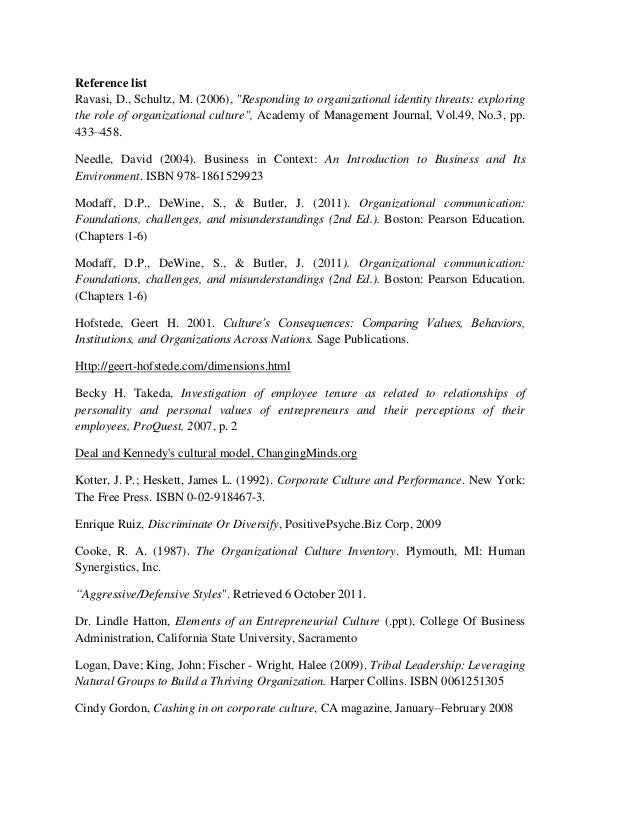Deal And Kennedy Corporate Culture Pdf Free


In their work on the subject of culture, Deal and Kennedy suggested that the basis of corporate culture was an interlocking set of six cultural elements: History – A shared narrative of. Get the Free Newsletter. Learn new career skills every week, and get our Personal Development Plan Workbook FREE when you subscribe. Zlatka Meško Štok, Mirko Markič et al • Elements of organizational culture leading. • 2010 • vol. It has been widely acknowledged that organisational culture is significant in organisational behaviour and performance (Trice and Beyer 1993; Deal and Kennedy. Understanding Organizational Culture. Culture is created by means of terminal and. Including Terrence Deal and Allan Kennedy’s Corporate Cultures. Deal And Kennedy Corporate Culture Pdf. Corporate welfare - Wikipedia. Corporate welfare is a term that analogizes corporate subsidies to welfare payments for the poor. It highlights how wealthy corporations are less in need of such treatment than the poor. Its leader, David Lewis, used the term in the title of his 1. Louder Voices: The.
Definition Corporate culture can be thought of as the sum total of an organization's knowledge and history that is cultivated by it over a period of time that results in commonly held values, norms, customs, paradigms and worldviews shared by the members of the organization. This culture shapes how you view your organization and how you view yourself in it. It helps guide you in integrating into the organization and in interacting with the organization's outside environment. Types of Corporate Cultures There are numerous theories of corporate cultures and descriptions of corporate cultures.
We'll take a look at the theory developed by T.E. Deal and A.A. Kennedy, who wrote Corporate Cultures (1982).
Deal and Kennedy discovered four basic types of corporate culture in their studies. • Tough guy/macho culture. This type of culture consists of employees who are very individualistic. Employees and the company take big risks.
Feedback is rapid. The focus is on speed, success and the short-term. It's all about what you did for the company today.
Today's company hero can be fired tomorrow. Companies with this type of culture tend to be in high stakes businesses such as construction, venture capital, investment banking, and stock brokerages. Veritas Volume Manager Download For Solaris X86 32 Bit.
• Work hard/play hard culture. This culture is also about the short-term. There is also quick feedback. However, the members contend with a large number of low-risk activities. The more work, the more chance at success, the more success. 90 Syndrome Software Project Management.
Success equals persistence and the environment is supposed to be fun. A commissioned sales environment is the epitome of this type of culture with the high-adrenaline sales, pressure and competition. • Bet-your-company culture. If you think of the tough guy/macho and the work hard/play hard cultures as the hares of corporate culture, you can think of the bet-your company culture as the tortoise. In this culture, the stakes are high, but there is very slow feedback. Investments take a huge amount of capital and a long time to develop.
Organizational stamina is key. Organizational action must be very deliberate, and the organization usually utilizes top-down decision-making given the importance of long-term strategy and investment in the future.
Examples of companies that demonstrate this type of culture include aerospace companies, oil companies, mining companies, and space companies. • Process culture. Process cultures must deal with long-term ambiguity. They operate in a low-risk environment, but feedback is nearly non-existent. It's hard to measure output and goal achievement. The focus becomes more about how things are done instead of what things are being done.
This culture requires conformance to rigorous hierarchies and very specific procedural rules. Protectiveness and caution are valuable traits. Examples of this type of culture are the stereotypical government bureaucracy, banks and utility companies. Here's a table that parses out the key distinctions: Culture Time Outlook Risk Level Tough guy/macho Short-term High Work hard/play hard Short-term Low Bet-your-company Long-term High Process Long-term Low Lesson Summary Corporate culture is the sum total of a company's history and knowledge that results in commonly held values, norms, customs, paradigms and worldviews shared by the members of the organization. Culture shapes how you act and deal with the outside environment, and what you must do to integrate into the organization. Four types of corporate cultures identified by Deal and Kennedy include tough guy/macho, work hard/play hard, bet-your-company, and process cultures. Each can be characterized by whether it is oriented to the short-term or long-term and the level of risk in which it engages.